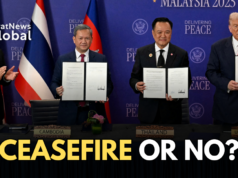NEW DELHI: Sheikh Hasina has taken oath as prime minister of Bangladesh for the fourth consecutive term after winning a landslide in the 12th general elections, the fairness of which has been questioned by the Opposition and the West alike. The U.S State Department has said that the elections were ‘not free and fair’. “The United States remains concerned by the arrests of thousands of political opposition members and by reports of irregularities on election day.”
It’s a view echoed by a section of Bangladeshis as well but then there are some who disagree, saying there’s been an international conspiracy to demonize this election, which includes showing that it’s kind of a one-way road and it’s all about Awami League but the reality is very different, Dr Sharin Shajahan Naomi, an academic and activist from Bangladesh, told StratNews Global.
“The Awami League has won 223 seats but 60 seats have gone to Independent candidates. There is also a tendency to show these candidates as dummy candidates but in reality they have given a very hard time to Awami League candidates at the grassroots level so we could also expect that these 60 candidates are going to be a very strong Opposition voice in parliament.”
There have been allegations that the so-called Independents were actually propped up by the Awami League, and some of these were deserters from the BNP (ex-PM Khaleda Zia’s party that’s among those that boycotted what they called a sham poll).
Dr Naomi refuses to call the BNP a major opposition party “because in the last five years they had no connection with the grassroots level and were busy lobbying with some Western countries and the international media to portray Bangladesh as an autocratic State”. They crave for power and their only motive was to bring about a regime change, she alleged. “It’s a new phase in Bangladesh which will be difficult for some people to accept and absorb because they are so used to seeing the BNP and the Jamaat, which is a fundamentalist party, as the Opposition that without them they’re feeling a bit uncomfortable.”
She says the rural population, especially Hindus, actively took part in the election and voted for Sheikh Hasina as she’s seen as a protector, someone who brought stability and security that “Bangladesh has never seen before”. Women feel much safer and there’s gender parity, the ground realities are different but the elite in Dhaka and a section of the international media have different views, she claims, attributing the differing perceptions as a clash between political narratives.
There have also been fears about the rise of fundamentalist elements and religious intolerance but there are some who claim those are unfounded. The Jamaat is a fundamentalist party and they favour imposition of Islamic law but that’s not the view shared by the majority in Bangladesh, Major Shamsul Arefin (Retd), a veteran of the Bangladesh Liberation War of 1971, researcher and political analyst told StratNews Global. “The Jamaat has never won a parliamentary seat without the help of the BNP and in the future too they won’t. In a Muslim-majority country, they definitely have a say but it doesn’t affect the common people or the government in Bangladesh.”
Dr Naomi credits the Sheikh Hasina government with changing the country’s image: “From that of a poor country that used to be heavily dependent on the West to a nation that now aspires to be the next Malaysia by 2041.”
That’s still a long way off and, in the interim, discordant voices will reverberate.
Related Content:




